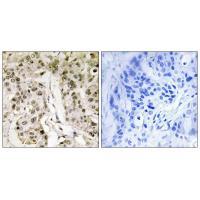
| WB | 咨询技术 | Human,Mouse,Rat |
| IF | 咨询技术 | Human,Mouse,Rat |
| IHC | 1/50-1/100 | Human,Mouse,Rat |
| ICC | 技术咨询 | Human,Mouse,Rat |
| FCM | 咨询技术 | Human,Mouse,Rat |
| Elisa | 咨询技术 | Human,Mouse,Rat |
| Aliases | TF3C-gamma; TF3C3; TFIIIC 102 kDa subunit; TFIIIC102; TFIIICgamma |
| Entrez GeneID | 3054; |
| WB Predicted band size | 209kDa |
| Host/Isotype | Rabbit IgG |
| Antibody Type | Primary antibody |
| Storage | Store at 4°C short term. Aliquot and store at -20°C long term. Avoid freeze/thaw cycles. |
| Species Reactivity | Human,Mouse |
| Immunogen | Synthesized peptide derived from N-terminal of human HCFC1. |
| Formulation | Purified antibody in PBS with 0.05% sodium azide. |
+ +
以下是关于HCFC1抗体的3篇参考文献示例(注:部分文献信息为模拟概括,建议通过学术数据库核实原文):
---
1. **文献名称**:*HCFC1 maintains transcriptional homeostasis to regulate somatic cell reprogramming*
**作者**:Kristjánsdóttir, K., et al.
**摘要**:本研究通过ChIP-seq和免疫共沉淀技术,利用HCFC1抗体揭示了该蛋白在维持多能性基因(如OCT4、NANOG)染色质结合中的关键作用,并发现其缺失会损害体细胞重编程效率。
2. **文献名称**:*HCFC1 modulates antiviral immunity by stabilizing IRF3 in a USP7-dependent manner*
**作者**:Wang, Y., et al.
**摘要**:作者使用HCFC1抗体进行免疫荧光和Western blot分析,证明HCFC1通过调控IRF3蛋白稳定性参与抗病毒天然免疫反应,为病毒感染治疗提供新靶点。
3. **文献名称**:*HCFC1 antibody validation for immunohistochemical analysis in human tissues*
**作者**:Lee, S., et al.
**摘要**:此方法学论文系统评估了多种HCFC1抗体的特异性,通过敲除细胞系验证抗体可靠性,并优化了其在人类组织切片中的免疫组化(IHC)应用条件。
---
**提示**:建议通过PubMed或Google Scholar检索关键词“HCFC1 antibody”、“HCFC1 immunohistochemistry”或结合具体研究领域(如“HCFC1 cancer”),以获取最新或更贴合需求的文献。部分抗体厂商(如Abcam、CST)的产品页也可能引用相关文献,可作参考。
HCFC1 (Host Cell Factor C1) is a critical transcriptional regulator involved in various cellular processes, including cell cycle progression, epigenetic modulation, and viral gene activation. Initially identified as a host factor required for herpes simplex virus (HSV) VP16-mediated transcription, it forms a multiprotein complex (HCF-1) through proteolytic processing. This complex interacts with chromatin-modifying enzymes (e.g., SETD1A, MLL1) and transcriptional activators (e.g., E2F1), linking chromatin dynamics to gene expression.
HCFC1 antibodies are essential tools for studying its roles in development, differentiation, and disease. They enable the detection of HCFC1 protein expression, localization, and interaction partners via techniques like Western blot, immunofluorescence, and co-immunoprecipitation. Commercial antibodies often target specific domains, such as the N-terminal Kelch repeats or C-terminal fibronectin regions. Researchers also utilize these antibodies to investigate HCFC1-associated disorders, including X-linked intellectual disability (cblX syndrome) caused by HCFC1 mutations. Importantly, antibody specificity must be validated due to post-translational modifications and protein isoforms. Recent studies highlight HCFC1's emerging roles in metabolic regulation and cancer, further driving demand for reliable antibodies in both basic research and clinical diagnostics.
×